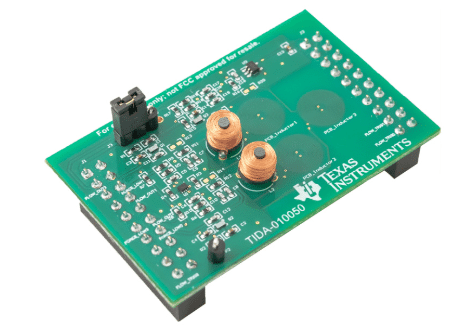The design offering a highly efficient and reliable solution for AMR add-on modules in water, heat, and gas metering applications.

The growing global demand for smart water meters is driving the replacement of traditional mechanical meters. Instead of fully replacing these meters with electronic counterparts, integrating electronic add-on modules offers a cost-effective alternative. This approach balances affordability with competitive performance, making it a compelling market solution. The TIDA-010050 reference design, developed by Texas Instruments (TI), leverages the CC1312R SimpleLink ultra-low-power wireless MCU to create a low-cost LC sensing subsystem. This subsystem detects disc rotation with exceptional energy efficiency and performance. The design presents a single-chip solution that innovatively combines flow measurement with wireless Automatic Meter Reading (AMR) capabilities, offering a compact and budget-friendly option.
It is compatible with any CC13x2 and CC26x2 SimpleLink™ low-power RF wireless MCU, all of which feature an integrated sensor controller engine. This fully tested design demonstrates a robust solution for electronic water flow measurement when paired with mechanical meters, enabling wireless communications for AMR modules. These modules seamlessly integrate into existing mechanical meters, facilitating advanced functionalities without replacing the entire system. The RF subsystem supports protocols like wireless M-Bus and proprietary formats in Sub-1 GHz ISM bands, ensuring reliable and accurate readings over longer distances. Furthermore, the ultra-low power consumption extends battery life, a critical requirement for battery-powered smart water meters.
Key features include a single-chip solution integrating flow metrology and RF communication, compliance with ISO4064-1:2014-11 (Class 1) measurement accuracy standards, and ultra-low power operation consuming only 1.83 µA at a 16 Hz sampling rate on a 3.3-V power supply. It can accurately measure rotations up to 5.8 mm from the disc and is supported by comprehensive design documentation, firmware, and test reports. The CC1312R wireless MCU targets various wireless protocols, including wireless M-Bus, IEEE 802.15.4g, 6LoWPAN, ZigBee, KNX RF, and Wi-SUN, making it versatile for a wide range of applications.
Smart water meters typically operate on batteries, emphasizing the importance of low power consumption to achieve a 10-year battery lifespan. The compact design of electronic add-on modules further constrains battery capacity. Most flow meters report measurements infrequently, leveraging RF communication only a few times daily. However, continuous monitoring of flow requires frequent wake-ups of the MCU, making energy efficiency a significant challenge.
TI has tested this reference design. It comes with a bill of materials (BOM), schematics, assembly drawing, printed circuit board (PCB) layout, and more. The company’s website has additional data about the reference design. To read more about this reference design, click here.






